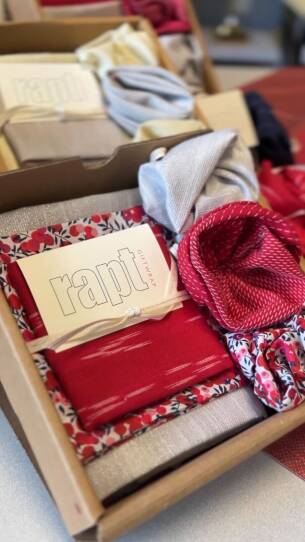Household waste increases about 25% every year between Thanksgiving and New Year's Day, according to the Environmental Protection Agency. Packaging materials, decorations, food waste and unwanted gifts all add up.
Janet Domenitz, the executive director of environmental advocacy group MASSPIRG, says reducing waste is about getting back to the basics and finding simple, creative ways to reduce your consumption across the board, especially when it comes to gifting.
“We are bombarded with messages about purchasing new things being synonymous with the joy and giving season of the holidays,” she said. “We just need to break through that.”
You can help. From finding the perfect gift to cleaning up after the holidays, there are plenty of ways to cut back on waste this season.
Ditch the wrapping paper, or reuse what you already have
The rules vary city to city, but in Boston, most wrapping paper and bows are not recyclable. That’s why it’s important to cut down on wrapping waste from the start.

Reduce: Domenitz said she looks at what she already has that could be repurposed as wrapping material, like magazine pages. She's wrapped gifts for sports fans with the sports section of a newspaper, and wrapped kitchen-related gifts in a towel.
“Just look around the house, you have something to wrap a gift in,” Domenitz said.
Reuse: There’s a growing U.S. market for gift wrap that’s made specifically for multiple uses.
One local option is Rapt, which sells double-sided fabric inspired by Japanese wrapping tradition of furoshiki.
“You turn [the cloth] on a diagonal. It’s a reflection of a change of mindset,” said Monica O’Neil, who co-founded the Belmont-based sustainable gift wrap company with her friend Cindy Estes. “When you see it, you can’t believe we haven’t been doing it forever.”
Rapt sources deadstock material from fabric companies in California and on Long Island.
The first question customers ask her about the product? If they can take it back after giving a gift away.
“That’s the second present: you’re going to reuse it,” O’Neil said. “Our vision is that this will be in circulation. It’s going to circulate among friend groups, among families.”
Recycle: What if you receive a gift in traditional wrapping paper or a gift bag? In those cases, check with your city or town before tossing it in the bin. Most municipalities' websites have a quick search tool for exactly this purpose.
Compost your Christmas tree, or regift it to farm animals
More than 200 Massachusetts cities and towns provide options to recycle your Christmas tree, often through curbside pickup or a central drop-off location, where they are then chipped into mulch and used for municipal landscaping projects, according to the state Department of Environmental Protection.
Several local farms also accept tree donations, which they use to feed their goats and sheep. Unity Farm Sanctuary in Sherborn is one of them, and co-founder Kathy Halamka says the gifted trees are great for the animals.

“It’s a distraction, a treat and a dewormer," she said. “Vitamin C, vitamin A, all kinds of good stuff.”
Some big box stores that ship trees nationally use fire retardants and other additives, Halamka said, which can be dangerous for the animals. She says organic trees are best for donations, along with those sold at local farm stands.
After the animals have eaten, Unity Farm Sanctuary also grinds up the tree scraps and uses the mulch for walking trails on the property.
“It’s a sustainable operation that makes sense," Halamka said.
Shop smart and donate unneeded food
Food is a huge contributor to everyday household waste. The EPA recommends assessing your cupboards and refrigerator before you make your shopping list to avoid unneeded purchases, eating your leftovers and using your freezer to preserve excess dishes.
If you end up with unopened and unwanted ingredients, you can take it to your local community fridge. These volunteer-run pantries and fridges are seeing increased demand at this time of year, so your food will go somewhere it's needed instead of sitting forever on a shelf.
Your local food pantry may also accept donations, but it's important to check what they will take before planning a drop-off.
Choose gifts with sustainability in mind
Before you think about wrapping and holiday cleanup, sustainability starts with the gifts you buy, Domenitz said. She suggested shopping first at thrift stores, which often reinvest profits back into the communities they operate in. She also recommended participating in your local "Buy Nothing Group" on Facebook, where members offer up items they don't need anymore for free.
MASSPIRG suggests gifting services instead of new goods — like a tuneup for a bike your friend already owns — or upcycling things that would otherwise be thrown away.
“There are so many ways to share gifts and generosity during the holidays,” Domenitz said.
Correction: This article has been updated to correct the spelling of Cindy Estes' last name.





